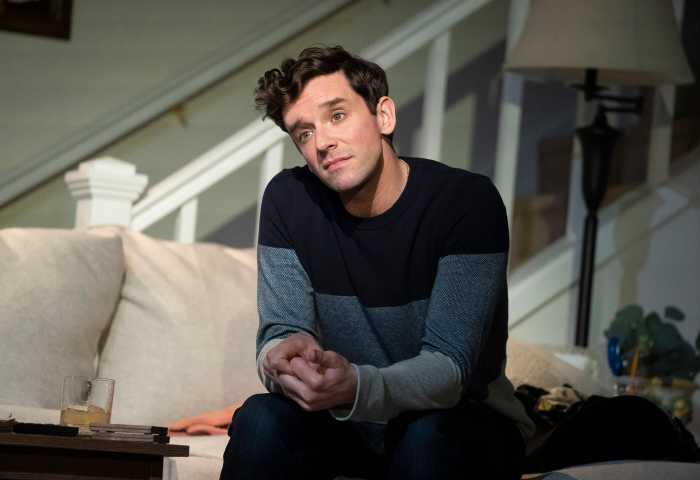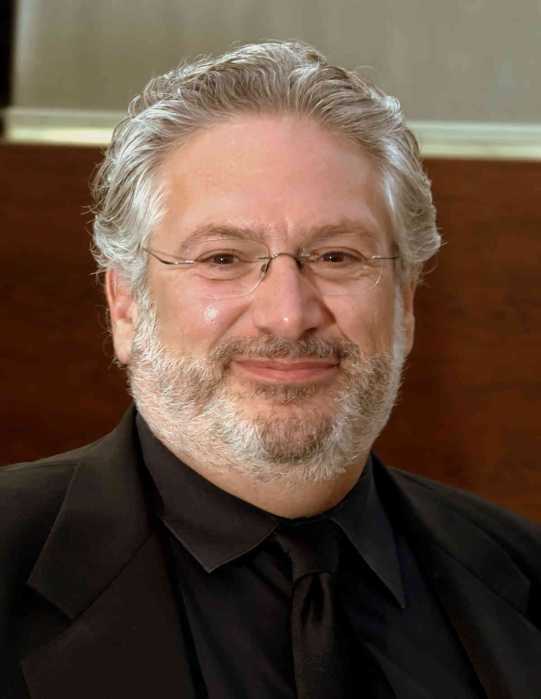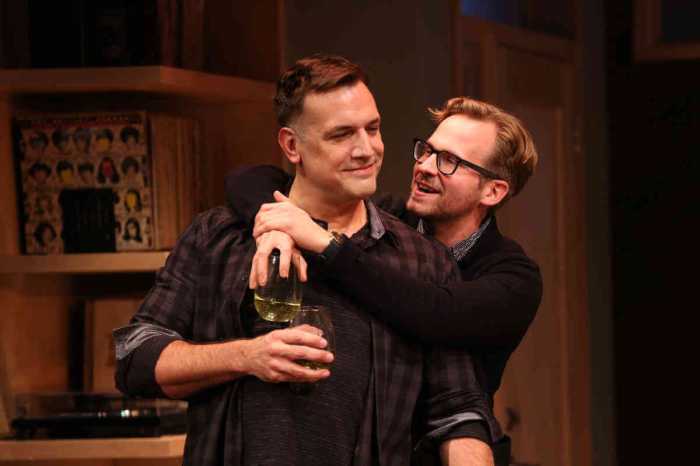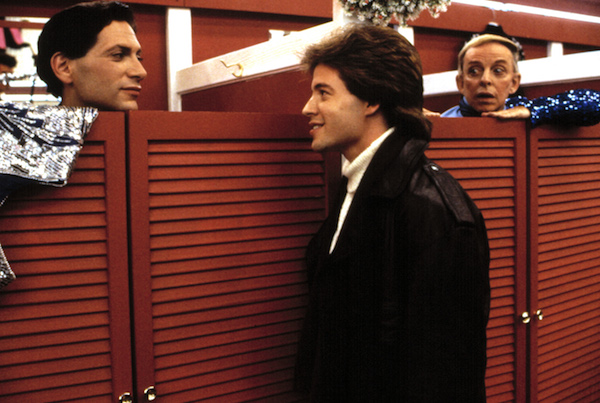Douglas Hodge and James Cusati-Moyer in Terrence McNally’s “Fire and Air,” directed by John Doyle, at CSC through March 2 only. | JOAN MARCUS
Terrence McNally’s spellbinding new play “Fire and Air,” now at CSC, is ostensibly about the impresario Sergei Diaghilev, the fate of his Ballets Russes, and his artistic and sexual relationship with dancer Vaslav Nijinsky. As a chronicle of early 20th century art and a study of a complicated genius, it’s fascinating on its own (in the vein of his “Master Class,” which gave similar treatment to opera star Maria Callas). McNally, however, has deeper issues in mind, some incredibly timely. Or rather, one should say, timeless, reflecting the age-old complicated relationships of artists to one another, to their art, and to the culture.
McNally’s study of Diaghilev beautifully examines whether passion in art can exist separately from the people involved or that passion, by its very nature, consumes lives and souls. Diaghilev the man is inseparable from the art, and that is his genius — and his tragedy. A failure as a composer himself, Diaghilev found his métier as a producer, his mission with Ballets Russes to introduce Russian art to Western Europe while also pursuing efforts to revolutionize dance, music, and painting. Although Diaghilev was instrumental in the careers of Picasso, Stravinsky, Cocteau, the relationship between Diaghilev and Nijinsky is central to the play. Was it love? Certainly for Diaghilev, who was overweight and covered with painful boils. For Nijinsky, whether the sexual relationship was love or opportunism is unclear, but the creative partnership was the pinnacle of each man’s career.
When Nijinsky marries a dancer from the corps on a South American tour, Diaghilev cuts all ties — only to have the role of lover and muse filled by a young dancer, Léonide Massine. The story also chronicles the collateral damage suffered by others in Diaghilev’s inner circle, including his cousin and manager Dima, his childhood nurse Dunya who still attends him, and his friend and benefactress Misia. They are the scorched moths around Diaghilev’s candle, loyal to the end though each suffers for that loyalty.
Terrence McNally in top form, a good reason to go back to SoHo, a dark, dead-end comedy
John Doyle’s economical direction on a mostly bare stage with only a large mirror and gilded chairs is the perfect counterpoint to the complexities of conflict and emotion at play. This spare theatricality keeps the focus on the characters and their internal lives. It doesn’t hurt that the cast is outstanding.
Douglas Hodge leads with a galvanizing performance as Diaghilev, filled with excess and drive while always remaining sympathetic. James Cusati-Moyer plays Nijinsky with an equally impressive range and beautiful, understated movement. There are no recordings of Nijinsky’s dancing, aside from one film referenced in the play but never seen by the audience, and Cusati-Moyer doesn’t dance. Rather Doyle places him in poses that perfectly evoke the period but underscore the fact that while Nijinsky is world-famous his dance lives only in our imaginations. It’s a brilliant touch.
The rest of the cast is outstanding, including John Glover, in an understated and moving performance as Dima, and excellent work from Jay Armstrong Johnson as Léonide, Marsha Mason as Dunya, and Marin Mazzie as Misia.
Fire and air create combustion. Diaghilev lived to be only 57, but in that time he burned bright and challenged and changed art, bringing both dramatically into the 2oth century. McNally’s play reflects so many of that light’s colors that it is every bit as dazzling as its subject.
If you haven’t yet seen “Bright Colors And Bold Patterns,” there’s still time. The comedy, written by Drew Droege and directed by Michael Urie, now stars Jeff Hiller, one of my very favorite comic actors, in a tour de force lead role. Hiller plays Gerry, one of a bunch of friends who have gathered at a tacky house in Palm Springs before the wedding of two of their gay friends. Hiller, who replaced playwright Droege, is in perpetual motion as Gerry goes off on one thing after another, bitches about the wedding invitation, drinks, drugs, barfs, and more. It also has a heart, and Hiller nails every laugh and every poignant moment. Though I knew what was coming, I found myself in stitches all over again as hilarious Hiller makes this part completely his own. Go see it. You’ll have a blast. (My review of Droege’s star turn can be found at gaycitynews.nyc/boys-band.)
Jeff Hiller in Drew Droege’s “Bright Colors And Bold Patterns,” directed by Michael Urie, at the SoHo Playhouse through April 1. | RUSS ROWLAND
You will need to bring your game face if you venture to see “Party Face,” the new dark comedy by Isobel Mahon. And when I say dark, I mean obscure. At best, it’s a grin and bear it experience because the characters are unfathomable and the plot doesn’t have twists so much as incomprehensible jerks that are simply bewildering.
Mollie Mae is back from the sanitarium after a nervous breakdown during which she took a sledgehammer to her new marble counter and her husband left her. Her passive-aggressive mother, Carmel, hosts a welcome-home party that includes sister Maeve as well as Chloe, an irritating woman from down the block. Nearly halfway into the party, Bernie, Mollie Mae’s germophobic roommate from the mental hospital, arrives. For no particular reason, the party devolves into fights and shouting, with not so much scenes as eruptions that include New Age exercises, a discussion of obscene topiary, a sink springing a leak, accusations of husband poaching, and long-buried resentments bubbling to the surface. Since this is Dublin, everyone drinks a great deal. That’s a lot of plot for 100 minutes, and it feels like Mollie Mae’s sledgehammer has been used to get it all in.
Even lovely Hayley Mills as Carmel can’t elevate this amateurish mish-hash. Mills is charming and elegant, but playing a borderline nut of a parent she’s trapped in the script. Gina Costigan is fine as Mollie Mae, though she doesn’t get to do much more than be depressed, and Klea Blackhurst (a wonderful cabaret artist) is wasted as Bernie, who spends the second act covering things in Saran Wrap. At the performance I saw, understudy Alison Cimmet went on as Chloe, and she was the highlight of the piece. It’s not that her part made any more sense than the rest of the play, but she’s a sparkling comedienne in the classic sense and gave the show what life it had.
Trying to make sense of this play nearly gave me a nervous breakdown, so it’s one party I’m glad I won’t have to face again.
FIRE AND AIR | Classic Stage Company, 136 E. 13th St. | Through Mar. 2: Tue., Thu. at 7 p.m.; Fri.-Sat. at 8 p.m.; Sat.-Sun. at 3 p.m.; $61-$126 at ovationtix.com or 866-811-4111; Two hrs., with intermission
BRIGHT COLORS AND BOLD PATTERNS | SoHo Playhouse; 15 Vandam St., btwn. Sixth Ave. & Varick St. | Through Apr. 1: Fri.-Sat. at 9 p.m.; Wed., Sun. at 7:30 p.m.; $14-$89; sohoplayhouse.com; 80 mins., no intermission
PARTY FACE | City Center, Stage 2, 130 W. 56th St. | Through Apr. 8: Mon., Thu.-Sun. at 7:30 p.m.; Thu., Sat. at 2:30 p.m.; Sun. at 3 p.m. | $38-$128 at citytix.com or 212-581-1212 | Two hrs., with intermission




































